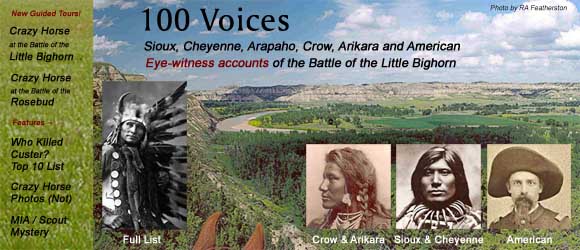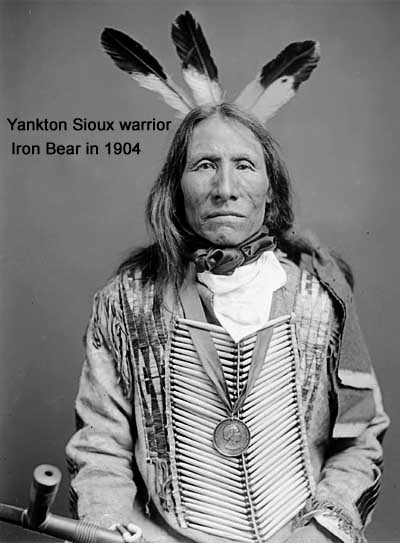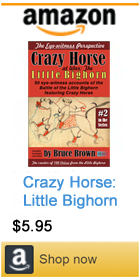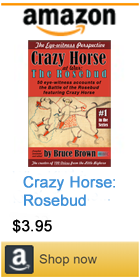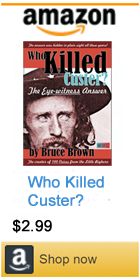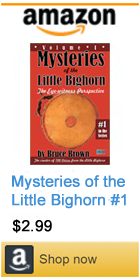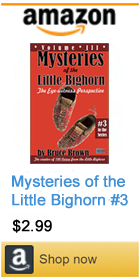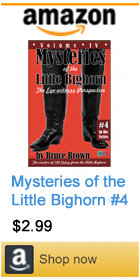|
||||||||||||
Bruce Brown's 100 Voices... Thunder Bear's Story of the Battle
THUNDER BEAR'S STORY The Yanktonai were camping at Old Fort Peck in 1876. Four of us decided to visit Sitting Bull's camp on Pezhi sda wak-pa, Grease Grass river (Little Big Horn). So I, Medicine Cloud, Iron Bear, and Long Tree, with Medicine Cloud's wife, started in the first part of June. We struck Powder river below where Miles City is now and followed the trail leading southwest. We had been in the big camp about twenty sleeps when one morning the women who had been gathering turnips came riding in all out of breath and reported that the soldiers were coming. The country, they said, looked as if filled with smoke, so much dust was there. There were four big circles of Sioux and one of Cheyennes in the camp. The soldiers [of Reno's battalion] charged right up to the edge of the camp, dismounted, and began fighting. The horses became wild and we were still trying to catch them. Very few of us fell. But soon we gathered and charged. It was like a cloud of mosquitos. We rode right up to the soldiers' skirmish line. Indians and horses fell everywhere, some right among the soldiers. But more [Indians] were there and finally we made them run. Then right among them we rode, shooting them down as in a buffalo drive.They [Custer's battalion] ran to the top of a knoll and dismounted, one man holding four horses. We dismounted, too, and filled the gullies that the running water had made in the side of the hill. From there we could shoot straight up at the soldiers. Many of them fell, but the others kept shooting and killing some of us. The fighting continued, and what horses had not been killed, stampeded and rushed down the hill across the river, where the women and children were. The women captured them. All the time we kept closing in on them. One crowd of the soldiers left the hill and ran down into a deep ravine, but we gathered on the edge and shot them. Pahinhanska [Pehin Hanska `Long Hair,' meaning Gen. Custer] was killed in the middle of his men. We all knew him. His long hair had been cut off. We did not cut him up, or even scalp him. [Note: It is true that Custer had cut his hair short, and that he was not badly mutilated, but most observers said nobody recognized Custer during the battle. See Who Killed Custer - Top Ten List for more info.] After the fight was over and we returned to camp, I heard a bugle and saw on a hill three troops of cavalry, one with blacks, one with bays, [and] one with white horses. They were a lot of our young fellows, dressed up in the uniforms of the soldiers and mounted on their horses. After this the young men made ready to charge Reno's men, but just then scouts came from down the river, reporting that a big lot of soldiers were coming. The Cheyennes, being at the other end of [the] camp, got their horses first and did most of the fighting that occurred near the camp and in the retreat. A black man half-breeds [Isaiah Dorman] and Bloody Knife, the chief scout of the Arikara, were the first ones killed. At the end [of Custer's fight] we rushed among the men on the hill and killed them with clubs and arrows. Even the women, some of them, were there. There was such confusion that no honors could be counted, but we took some scalps from those whose hair was long enough. The Cheyennes got most of them. Chagha, Ice, [or Ice Bear, or White Bull] a medicine man, was chief of the Cheyennes. Sitting Bull, Tatanka Iyotanka, was chief of the Sioux. His chiefs were Shunka Hanska, Long Dog; I-to-ma-gho-zhi, Rain in the Face; Pizi, Gall; Mato Washte, Pretty Bear; Wi Sapa, Black Moon; Don't Paint His Face; Wanaghi Ska, White Ghost; Tatanka He Geleshka, Spotted Horn Bull; Tashunka Witko, Crazy Horse, [and] Wopide [or Wopiye], Medicine Bag That Burns. [Note: Medicine Bag That Burns or Burns The Medicine Bag was another name for Crow King. Wopiye itself is usually translated as simply "medicine bag."] This last man's [Wopide or Crow King] two brothers were killed on the hilltop, and his sisters came with axes and knocked the brains out of some wounded soldiers. [Note: according to Richard G. Hardorff, Crow King's two brothers were Swift Bear and White Bull.] One soldier got down to the river and lay there on his back in the water with only his nose showing. Some Indians watched him for a while and one shot him with a six-shooter. Sitting Bull was not in the fighting. He walked up and down, talking to the warriors. After the fight the Indian soldiers said nobody was to leave camp, for there were many from other agencies and they did not want the fight reported. But Iron Bear and I got away in the night and came back to Fort Peck. Rain in the Face was the bravest man there. Nineteen Sioux and seventeen Cheyennes were killed; but a great many were wounded. Seven Sioux and two Cheyennes were killed by Reno's men. Many horses were killed. Many soldiers shot wild into the air. That is why we think they were drunk. If they had not been they would have killed more of us. There were more than 2000 tipis in the camp, and in every one three or four young men, besides the older men. The first charge on the camp was about noon and lasted less than two hours. Indian Views of the Custer Fight: A Source Book by Richard G. Hardorff, The Arthur Clark Co. Spokane, WA 2004, p 87 - 92
Thunder Bear and Iron Bear reportedly brought first news of the Battle of the Little Bighorn to Fort Peck.
|
||||||||||||



